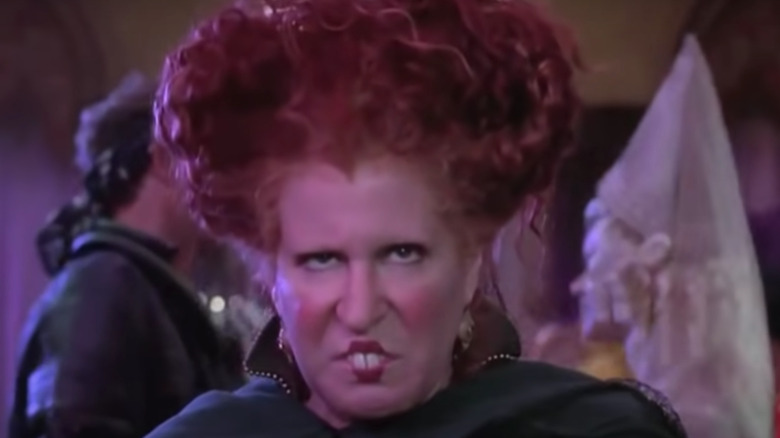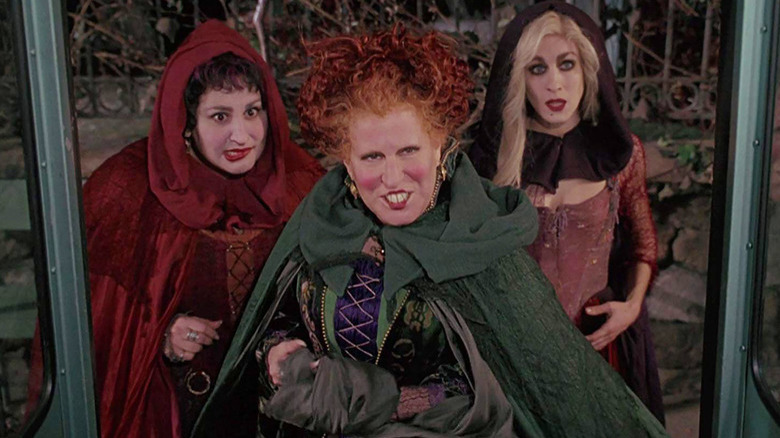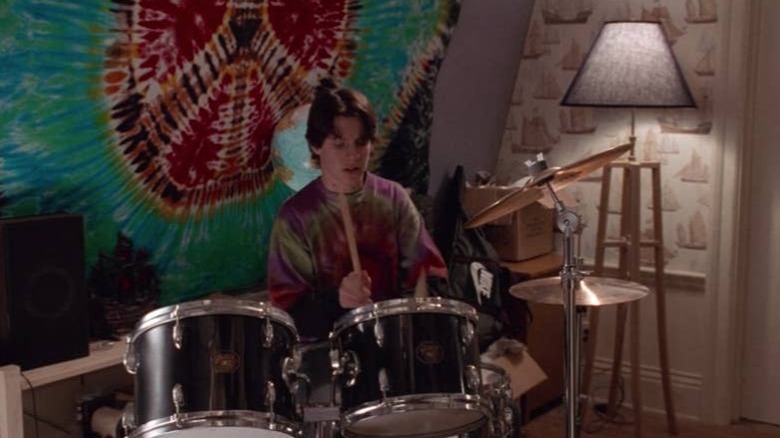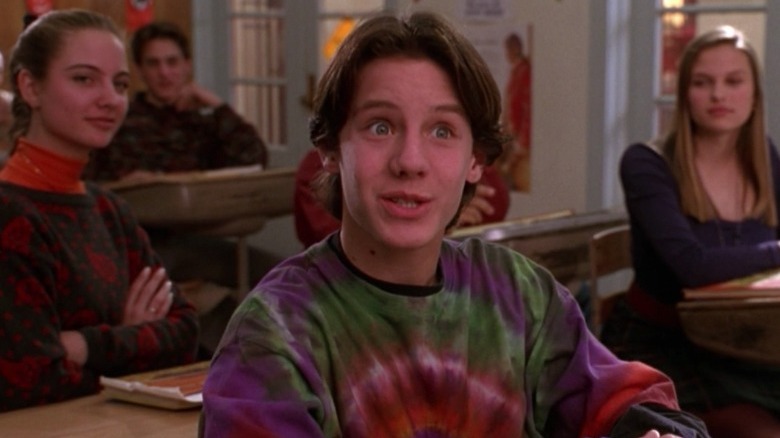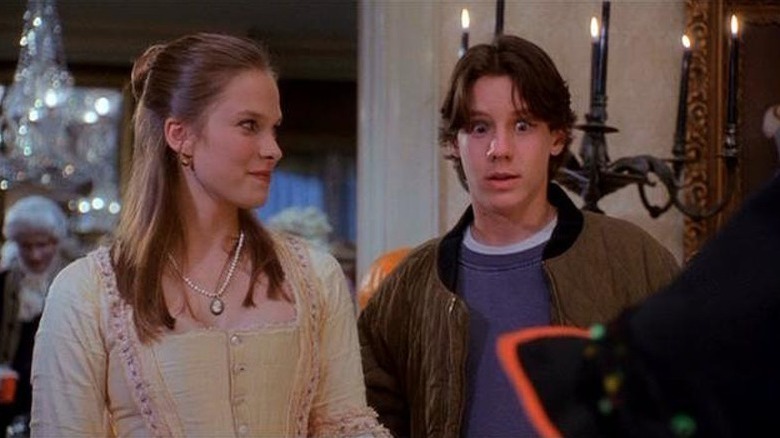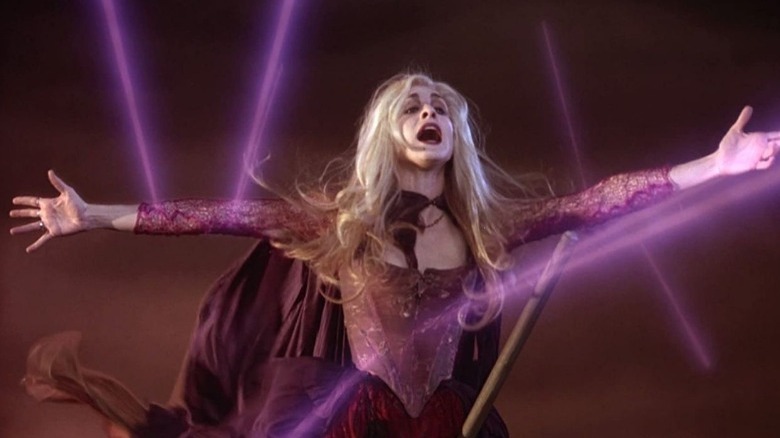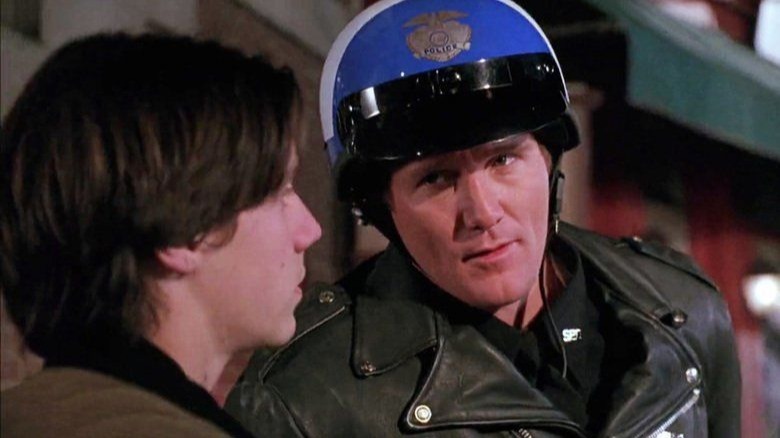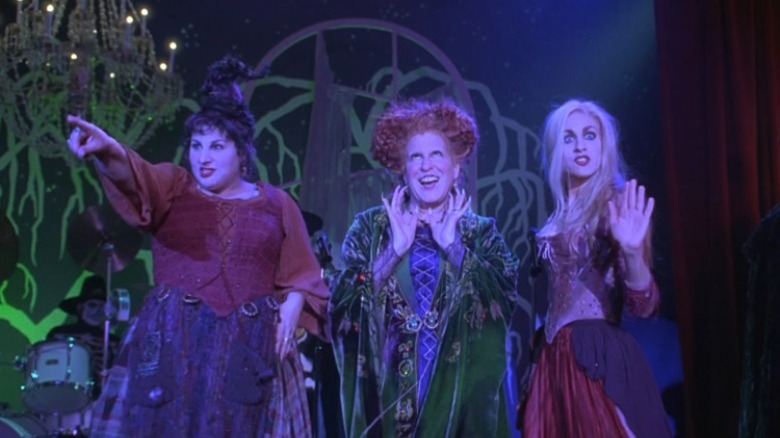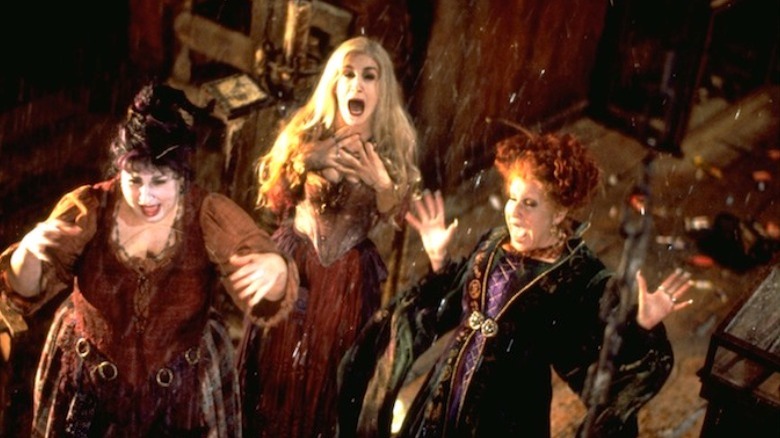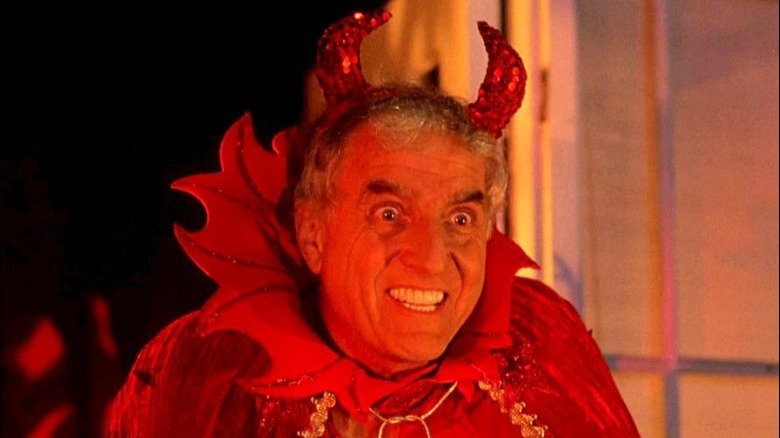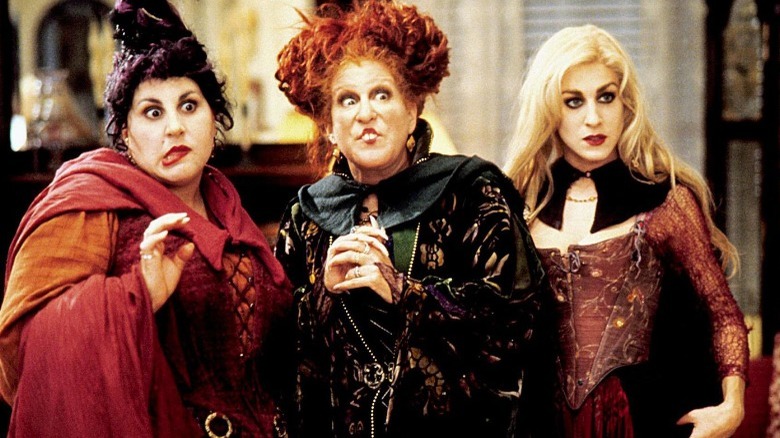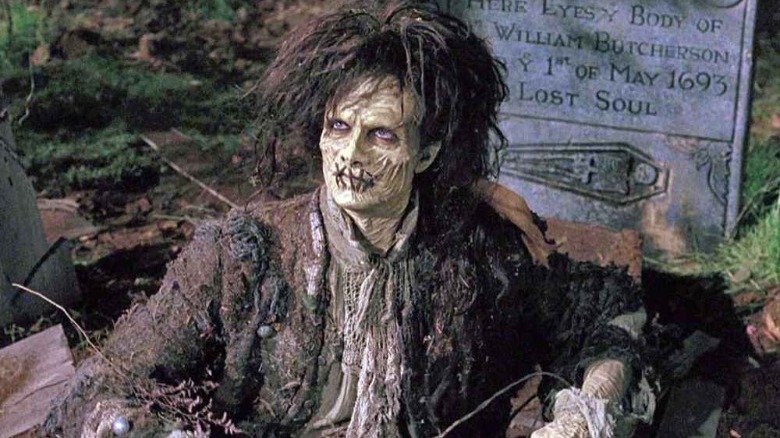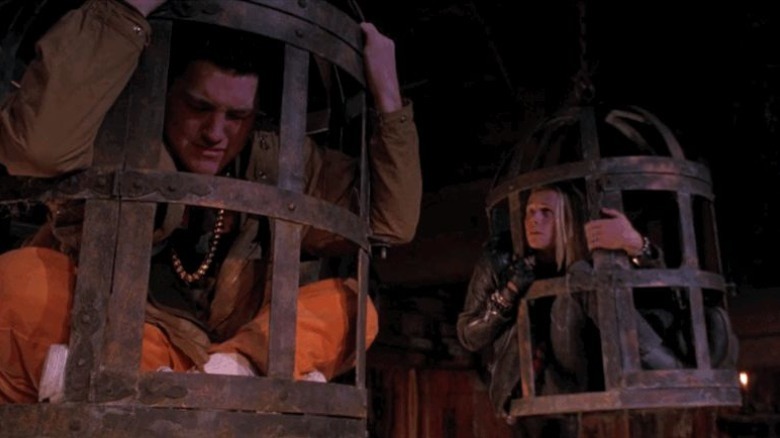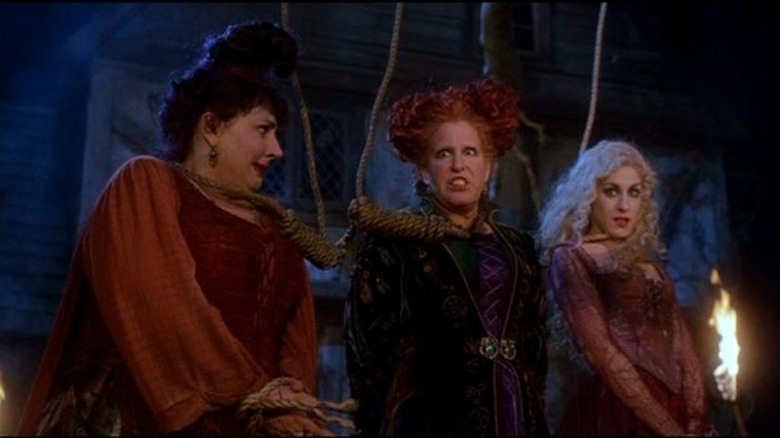Things Only Adults Notice In Hocus Pocus
Halloween is unique among the major holidays we celebrate. It's the darkest and most macabre, but also arguably the most closely associated with children (or at least trick-or-treating as an unaccompanied adult is usually frowned upon). Still, the vast majority of horror movies associated with the spookiest night of the year aren't appropriate for small children. Kids grow up with a strange, cartoonish understanding of All Hallow's Eve: one heavy on witches, black cats, and candy, but light on the occult and the gruesome implications of death.
In the gap between "House of 1000 Corpses" and "Scooby Doo" sits the cult Disney classic "Hocus Pocus." Released in 1993, the film has acquired such a following that a sequel is due to be released next year, 29 years later. Its enduring appeal likely stems from how it hits the sweet spot between a silly kids movie and a genuine fright fest, offering the right mix of autumnal spookiness, self-aware comedy, and outright camp. If you haven't watched it since you were a kid, it's likely wildly different than you remember, and filled with plot holes that might have seemed obvious even in 1993. These are the things only adults notice in "Hocus Pocus."
How did the Sanderson sisters escape notice for so long?
"Hocus Pocus" begins with a flashback to the year 1693, when the witches known as the Sanderson sisters brazenly kidnap a young girl, Emily Binx, to steal her youthful vitality. Winifred (Bette Midler), Mary (Kathy Najimy), and Sarah (Sarah Jessica Parker) have at some point made a deal with the devil for their book of occult spells. They live in a house in the woods filled to the brim with classic witch accessories like a giant cauldron, multiple candelabras, and a chimney constantly spewing purple smoke. It makes you wonder: How did they make it so far escaping the notice of the witch-wary Salem townsfolk?
Granted, their various powers might help them conceal themselves, and they're not exactly living on Main Street. Plus, the dialogue suggests they haven't been witches all that long at the time of the flashback; Emily seems to be the first child they've taken ("It's a start," Winifred says at one point, with a menacing promise to abduct many more). Still, as we learn throughout the rest of the film, the Sanderson sisters aren't particularly stealthy, subtle, or even all that competent at witchcraft. How they made it far enough to successfully lure a child into the woods (in full view of her older brother), we're not sure.
Max shouldn't be that upset about moving
At the beginning of the film, our hero, Max Dennison (Omri Katz), is sulking because he's had to move all the way from sunny Los Angeles, California, to gloomy Salem, Massachusetts. And sure, being uprooted during your childhood is traumatic, but re-examining the film after some years, it seems like Max is actually doing just fine.
Do a couple of bullies steal his shoes? Sure, that is pretty lame. But otherwise, his situation is pretty ideal. Salem couldn't be a more picturesque, low-key town —much less gridlocked and hectic than LA (we adults are always thinking about traffic). He has a huge room with its own crow's-nest lookout and plenty of space for his drum set. Plus, in the first scene set in the '90s, Max walks right up to his crush Allison (Vinessa Shaw) at school and gives her his number. He can complain all he wants, but Max seems like he's fitting right in at his new home.
The teenagers in Salem are a little too into Halloween
At some point, we all have to make the awkward transition from children to young adults, and often the result is a sense of irony or detachment; the eternal teenage "too cool for school" attitude, if you will. While it would be sort of neat to grow up in Salem and have a special, historical attachment to Halloween, it's pretty hard to believe that Max would be the only one in his class who thinks Halloween is lame and "invented by the candy companies."
This statement earns him jeers from all of his classmates. Meanwhile, Allison's explanation that Halloween actually originates from the celebration of All Hallow's Eve, gets a spontaneous round of applause. It seems in Disney movies there's no place for skepticism, not even for teenagers.
Everyone is a little too obsessed with Max's virginity
"Hocus Pocus" doesn't really get properly started until the Sanderson sisters return from the dead. The curse they use to come back involves a black flame candle in their cottage (which is luckily still standing 300 years later) being lit by a virgin on Halloween night. As it happens, Max is a virgin, so when he jokingly lights the candle, all hell breaks loose and the witches appear.
Of course, it's expected that a teenager in a Disney movie would be a virgin; it just doesn't usually even come up in the first place. It's even weirder that this fact manages to come up several more times during the rest of the movie, and is always played for awkward, winking laughs when it does. When our heroes try to explain the whole situation to a cop (actually just a dude in a cop costume), he smirks and asks Max if he's really a virgin. Plus, at the end of the movie, Thackery Binx ruefully tells his sister he would've reunited with her sooner, but he "had to wait 300 years for a virgin to light a candle." It's an exceedingly strange running gag in a mostly family-friendly film (Sarah Sanderson's boy-craziness is also a little odd).
The witches have very inconsistent powers
The strangest inconsistency in "Hocus Pocus" is how powerful and frightening the witches are supposed to be from one scene to the next. In the beginning, they siphon the life from a young child, cast lightning from their hands, and turn Thackery into an immortal cat who remains stuck that way even after they're hanged. That's pretty powerful stuff. Later, they entrance entire rooms of people and survive being burned in a kiln.
Why, then, can't they remember the ingredients for their potions without the spell book? Why does the life-siphoning process rely on a potion specifically when none of the other spells they cast seem to? The Sanderson sisters have powers that seem dictated solely by the needs of the plot from scene to scene, powers that don't follow any consistent rules or existing witch lore whatsoever.
Why doesn't Binx talk to anyone else?
At two different parts, our teenage heroes try to appeal to adults for help during "Hocus Pocus." They first approach a motorcycle cop, who reacts skeptically (and then turns out not to be an actual cop anyway). Then they find Max's parents at a dance party and try to tell them that literal witches have returned from the dead. Both times, you might find yourself shouting at the screen, "Have the talking cat explain it!" What sounds like a tall tale would certainly be easier to believe coming from such direct evidence of magic.
Indeed, there are multiple points when Thackery Binx, trapped for 300 years as a cat, could have served himself well by talking. At the beginning of the film, he's shooed away by his own father in 1693. Later, he attempts to prevent Max from lighting the black candle by yowling and jumping on him, when a simple "excuse me" probably would have been startling enough to prevent it. There might be some reasonable explanation for it—perhaps only Max, Allison, and Dani can hear him because they were there when the candle was lit?—but without at least a line in the script addressing why Binx only talks to three people, it's just annoying.
Why aren't there more musical numbers?
If you hadn't seen "Hocus Pocus," you might guess that it's a musical. It stars the legendary Bette Midler, after all, and it's directed by Kenny Ortega, who was fresh off "Newsies" at the time and would go on to direct "High School Musical." But the film only has one and a half songs- Bette Midler leads a big show-stopping performance of "I Put a Spell on You" when the witches entrance all the parents at the dance, and Sarah Jessica Parker sings a very brief song to lure children to the witches' cottage.
Another few songs and "Hocus Pocus" would have joined a long Disney musical tradition, but alas, that's all we get. It seems like a real missed opportunity, one that perhaps the sequel will rectify.
The witches have very selective knowledge of modern times
The Sanderson sisters have been dead for 300 years, from 1693 to 1993. They've missed quite a lot, so it's no surprise that they fall for Max's trick when he tells them that fire sprinklers are "the burning rain of death," or that they're confused by things like paved roads and buses. Max even fools them into thinking the sun has risen an hour early with a car's headlights.
In other scenes, they seem to fit right into the present at will. When Winifred bursts into song at the dance, she's not only familiar with Jay Hawkins' classic song "I Put a Spell on You," but she's also written her own alternate version of it, and her sisters jump on background vocals without hesitation. How did they know what they are? Later, Winifred flies alongside Max as he's driving and mockingly asks to see his driver's permit, displaying a deep knowledge of driving culture mere hours after calling the road a strange "black river."
Is there a witch afterlife?
It's mentioned that the witches' spell book was given to them by Satan himself, and later the sisters mistake a Halloween reveler for the devil in the flesh (played in a cameo by "Pretty Woman" director Garry Marshall). It's all fine and silly Halloween stuff for kids, but with an adult grasp of theology and metaphysics, it's a strange thread for "Hocus Pocus" to pull. No matter how you think about it, it leads to a lot of questions about how witches and the afterlife function in the world of the film.
If there's a Satan, whom the witches serve and love, why is it such a bad thing for them to die? Wouldn't they end up in Hell with their "master"? Are the witches (and Emily Binx) just lingering in some sort of Earth-bound purgatory when they're "dead"? It's one thing to not make it clear exactly how witchcraft works, but implying the existence of the devil and an afterlife of some sort upends all the stakes of the film if you're thinking about it too hard.
Is all the witches' dialogue improvised?
People of all ages would likely agree that the collective performance of Bette Midler, Kathy Najimy, and Sarah Jessica Parker as the Sanderson sisters is what makes "Hocus Pocus" so memorable. They're spirits of pure chaos, sometimes channeling fairy-tale-like menace, other times pure Scooby-Doo–villain incompetence. Watching the film from a modern perspective, however, their choices with the roles are so shambolic and strange you can't help but wonder what on earth was written in the script.
Bette Midler's Winifred has the most actual expository dialogue, but it seems like she took it upon herself to throw in the occasional bon mot like an old Vaudeville character ("It's curtains for ya, kid!"). Kathy Najimy shunts her jaw to the right incessantly and just kind of mumbles whatever Bette Midler just said. Meanwhile, Sarah Jessica Parker's whole performance seems inspired by someone doing hallucinogens at a festival for the first time. It's brilliant, inspired witch lunacy, but it kind of seems like they just made it up as they went along.
Why did Winifred raise her cheating ex from the dead?
In one of her more terrifyingly powerful moments, Winifred raises someone from the grave to chase our heroes for her, since witches can't step foot in the hallowed ground of the cemetery. But why, out of a whole graveyard's worth of people, did she choose Billy Butcherson, a former lover who cheated on her with her sister Sarah? If that wasn't already awkward enough, he died because Winifred poisoned him and sewed his mouth shut. A little heavy for a kids' movie, no?
It's no surprise, then, when Billy turns on her and helps the children instead. But what on earth took him so long?
Why didn't the witches just siphon life from another child?
Near the end of the film, just before sunrise, the Sanderson sisters are this close to completing their potion-ritual to siphon life from Max's little sister Dani, but are interrupted when Max and Allison rescue her and flee from the cottage. At this point, they're mere minutes until sunrise banishes them to actual, permanent death. Even though Dani gets away, they still have the potion, and all they need is a child, any child, to use it on. But in a rage, the sisters follow Max, Dani, and Allison back to the graveyard and ultimately meet their doom.
Why didn't they just use one of the two teenage bullies, who they conveniently had dangling from cages right there in the cottage? Or one of the dozens and dozens of children who were walking toward the woods, successfully enchanted by Sarah's song? Even as bumbling and irrational as the Sanderson sisters have been for the whole movie, it's an oversight that's hard not to notice during the action's climax.
Do spells last when witches die or not?
The news of a sequel, with all three sisters set to return, further muddles what was already confusing in "Hocus Pocus": Do spells last after the witches that cast them die? In 1693, Thackery Binx remains cursed to be a cat even after the sisters are hanged. But since they've arranged a curse involving the black flame candle to bring themselves back, perhaps that's not a real death?
That's certainly the case when they get burned up in a kiln in 1993: all of their spells remain in place, including Binx still being a cat (which should've been a clue for our heroes) and the enchanted parents dancing at the party. Finally, when the dawn does the sisters in, all of their spells seemingly cease in short order. The parents are released, Binx moves on to the spirit world, and Billy Butcherson returns to his grave. But it turns out they were just biding their time again, not really dead after all. They'll be back next year to provide more zany witchcraft (but probably no further clarity on this question).
